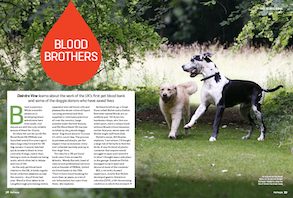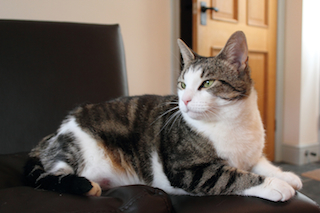Welcome to Petplan’s blog, a space where you can read up on the latest pet-news, find out interesting facts and tips about keeping your pets happy and healthy, and share your views on hot topics.
Refine articles by
clear searchHow to stop your cat spraying

Q: My 14-year-old Siamese-cross cat Max has started to spray everywhere, especially if he cannot get his own way. What can I do?
A: Spraying is the most common behaviour problem I see in cats. As Max has not sprayed before, I'd get him checked by the vet to ensure there is no underlying medical cause for his sudden change in behaviour. Has anything changed recently in his environment that may have caused him anxiety? It's important to pinpoint the exact cause of the behaviour so it can be dealt with. Don't tell him off because this may escalate the problem. Obtaining a Feliway® spray from your vet may help too.
Inga MacKellar, animal behaviourist
How Pet Blood Bank UK is saving dogs' lives

How you see the world. How your dog sees the world. And the massive difference between the two!

You may have heard that dogs see the world differently. We had too. But when author Jennifer Arnold called and gave us her insights into just how differently dogs see the world, we were blown away. So we've asked Jennifer to give us her 'top five' dog-sense facts. Prepare to be amazed!
1. Dogs actually understand very few words. Instead they rely on our tone and body language to glean the meaning in our voices. They can detect less then a tenth of a millimetre of movement, allowing them to pick up the smallest change in our posture and demeanour.
2. Since dogs don't have language, they remember things by taking 'snapshots' or small clips of smells, sounds and sights. They can recall those clips when placing their current circumstances in context.
3. Your dog would fail his drivers' examination without glasses. Dogs are quite near-sighted. What humans can see from 80 feet away, a dog cannot make out until he is 20 feet away. They do, however, have better vision in low light for motion than do people.
4. Your dog sees detail poorly, much as you would if you looked through a lens smeared with cooking oil.
5. Dogs do see colours but not the wide and vivid spectrum that most people see. Dogs can see blues, yellows and many shades of grey, but not green or red.
Finally, while our dogs may not always see well, their sense of smell boggles the mind! Dogs can smell parts per trillion compared to our ability to smell only parts per hundred. This means that a dog could detect a single drop of vanilla in an Olympic-size, chlorinated swimming pool.
For more insights on a dog's-eye view of the world, see Through a dog's eyes: understanding our dogs by understanding how they see the world by Jennifer Arnold (published by Souvenir Press, £18.99).
For a £3 discount off the RRP, with free P&P, call 01235 827702.
Finally, if you have any stories about YOUR dog's amazing senses, just get in touch by commenting below.
Bumbles is back in good health

When Stephanie Carrington's rescue cat Bumbles was diagnosed with asthma, Petplan ensured that her vet bills were covered...
My cat Bumbles has been diagnosed with feline asthma, and I'm so glad I went with Petplan for insurance.
I adopted Bumbles about nine months ago from Cats Protection - she had unfortunately been abandoned. She needed lots of love and attention to build her confidence back up, but she soon settled in and became part of the family. Bumbles was very happy but, as an indoor cat, she started to put on weight and was coughing. The vet confirmed that she had asthma.
Petplan were brilliant and helpful all the way, explaining everything to me and paying the vet directly, saving me £500 - and that was before Bumbles has even begun any treatment. She's now gradually losing weight and is a lot happier and more active. It's great to know that Petplan is covering her and will be there for any eventuality.
I wouldn't have been able to get Bumbles through the tests without Petplan. You've given me reassurance during a sad time that otherwise could have been an absolute nightmare.
Stephanie Carrington, via email
If you'd like to tell us your Petplan Customer Story, just email us at petplanblog@petplan.co.uk
Debate: are boy and girl pets really that different?


